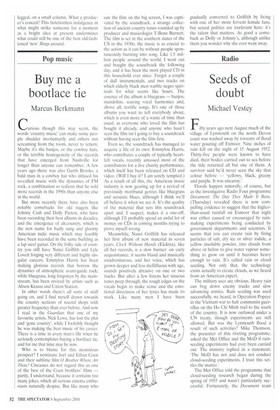Buy me a bootlace tie
Marcus Berkmann
Curious though this may seem, the words 'country music' can make some people shudder involuntarily and others run screaming from the room, never to return. Maybe it's the banjos, or the cowboy hats, or the terrible homogeneity of the records that have emerged from Nashville for longer than anyone can remember. A few years ago there was also Garth Brooks, a bald man in a cowboy hat who infused his so-called music with the dynamics of FM rock, a combination so tedious that he sold more records in the 1990s than anyone else in the world.
But more recently there have also been notable comebacks for old stagers like Johnny Cash and Dolly Parton, who have been recording their best albums in decades, and the emergence of alt.country, which is the new name for badly sung and gloomy American indie music which may feasibly have been recorded in the same building as a lap steel guitar. On the folky side of country you still have Nanci Griffith and Lyle Lovett forging very different and highly singular careers; Emmylou Harris has been making glorious records that borrow the dynamics of atmospheric avant-garde rock; while bluegrass, long forgotten by the mainstream, has been revived by artists such as Alison Krauss and Union Station.
In other words there's all sorts of stuff going on, and I find myself drawn towards the country sections of record shops with greater frequency than ever before. And now I read in the Guardian that one of my favourite artists, Nick Lowe. has lost the plot and 'gone country', while I foolishly thought he was making the best music of his career. There is a time in every man's life when he seriously contemplates buying a bootlace tie, and for me that time may be now.
Who is to blame for this monstrous prospect? I nominate Joel and Ethan Coen and their sublime film 0 Brother Where Art Thou? Cineastes do not regard this as one of the best of the Coen brothers' films — partly. I understand, because it contains too many jokes, which all serious cinema enthusiasts naturally despise. But like many who saw the film on the big screen, I was captivated by the soundtrack, a strange collection of ancient country tunes rounded up by producer and musicologist T-Bone Burnett. The film is set in the southern states of the US in the 1930s; the music is as crucial to the action as it can be without people spontaneously bursting into song. Like 1.5 million people around the world, I went out and bought the soundtrack the following day, and it has been the most played CD in this household ever since. Forget a couple of dull instrumentals, and two tracks on which elderly black men warble negro spirituals for what seems like hours. The essence of the album is bluegrass — banjos, mandolins, soaring vocal harmonies and, above all, terrific songs. It's one of those albums you want to tell everybody about, which is even more of a waste of time than usual, as everyone who loved the film has bought it already, and anyone who hasn't seen the film isn't going to buy a soundtrack without having seen the film first.
Even so, the soundtrack has managed to acquire a life of its own: Emmylou Harris, who contributes a couple of typically heartfelt vocals, recently amassed most of the contributors for a live charity performance, which itself has been released on CD and video. (Will I buy it? I am sorely tempted.) As a result of all this, the American music industry is now gearing up for a revival of previously moribund genres like bluegrass and acoustic blues. although I think we'll all believe it when we see it. It's the quality of the material that sets this soundtrack apart and, I suspect, makes it a one-off, although probably spend an awful lot of money on CDs in coming months trying to prove myself wrong.
Meanwhile, Nanci Griffith has released her first album of new material in seven years. Clock Without Hands (Elektra), like all her records, is a slow burner: on early acquaintance, it seems bland and musically unadventurous, and her voice, which has grown deeper and less mellifluous with age, sounds positively abrasive on one or two tracks. But after a few listens her sinuous tunes peep through, the rough edges on the vocals begin to make sense and the emotional directness of her lyrics has made its mark. Like many men I have been gradually converted to Griffith by living with one of her more fervent female fans, but sexual politics are irrelevant here: it's the talent that matters. As good a comeback as Dolly or Johnny's, although unlike them you wonder why she ever went away.


































































 Previous page
Previous page